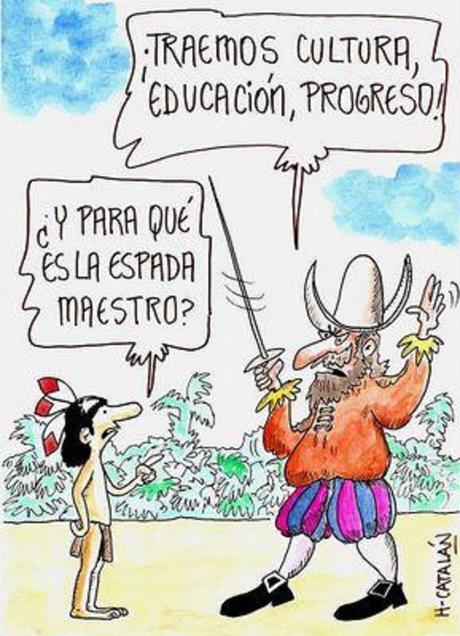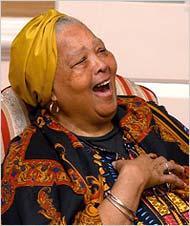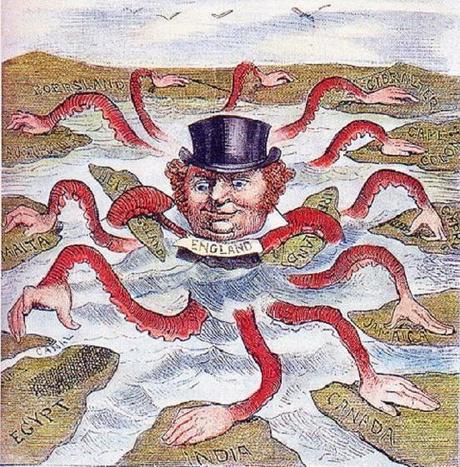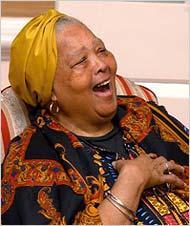-----------

Esta no es la primera vez que hablo sobre el colonialismo. De la mano de James Ngugi wa Thiong'o hablé en su momento de lo que significaba ser negro bajo el imperialismo inglés, o lo que opinaba una escritora blanca como Aphra Behn de la situación de los esclavos en la colonia de Surinam. Pero esta vez quiero centrarme en ese tema desde el punto de vista de la poesía, un arte literario tan desconocido como complicado para mí. Los temas más frecuentes dentro de la poesía postcolonial tienen que ver en la mayoría de las ocasiones con los dos grandes imperios: el inglés y el americano. Para hablar sobre nacionalismo, el tema más recurrente hace referencia a la superioridad de Inglaterra sobre las colonias, y poetas como la jamaicana Louise Bennett tienen poemas para dar y regalar en cuanto a esta cuestión. No olvidéis su nombre porque probablemente no sea esta la última vez que hable de ella, pero por ahora me voy a centrar en estos dos poemas, Dry-foot bwoy y No lickle twang. Su traducción vendría a ser 'Mushasho' pie 'mojao' y Ni un poco de 'asento'. Hay que explicar antes que nada que Louis Bennet escribía sus poemas usando la lengua criolla, una lengua mixta que nacía a partir de varias lenguas nativas, algo visto con desprecio por algunos puristas que despreciaban las lenguas sin complejidad gramatical ya que las consideraban vulgares e inferiores. Esta traducción se puede acercar más o menos a lo que le sonaría a un nativo español oír decir 'mushasho' o 'asento'. Lo primero que pensamos es que la persona en cuestión debe aprender ortografía urgentemente. Pues bien, mediante estos poemas, Bennet, también conocida como Miss Lou, expresaba lo que significaba ser americano. Y la visión de América desde el punto de vista de las colonias estaba relacionado con el poder imperial y el sentimiento de superioridad. Por esta razón, lo que Miss Lou hace es crear una dicotomía a través de estos poemas.

El primer poema cuenta la historia de un chico que intenta aparentar ser más listo de lo que realmente es, simplemente porque viajó a América: "¿C'a pasao con el 'mushasho' "pie mojao" de María? La' mushasha' se ríen de é' Y cuando le vi po' la noshe El 'mushasho' me dio e'panto Me cuenta que vio a su tía Y a su primo le dijo "jao ar yu" Y le pregunto cómo va to' Y dice "biutiful, biutiful"
Curioso fragmento, ¿verdad? Pues no veáis lo que he sufrido para traducirlo. Si buscáis el poema entero entenderéis por qué. Antes que nada, conviene explicar a qué se refiere con "pie mojado". Probablemente, Bennet se refiere a la ley estadounidense de 1995 aplicada a los cubanos mediante la cual se suponía que los que pisaban EEUU (pie seco) podían quedarse legalmente, mientras que se les prohibía la entrada a los que entraban en el país por mar (pie mojado). El chico del poema era del primer grupo.
Ahora vayamos con el segundo poema, que refleja todo lo contrario al primero: ¿No tiene' ni gueno' pantalone' O un abrigo 'shulo' Ni tiene' un diente d'oro Ni un colla' d'oro alrededo' del cuello? ¿Qué va a pasá' si vienen mi' amigo' Y te presento a un de'conosido como 'er' chavá' por el que lloraba que e'tuvo en América 'hase' na'?
En este caso, el tema central es la desilusión de una madre que ve que su hijo no se ha "americanizado" lo suficiente; que si diente de oro, que si collar de oro... En definitiva, han mandado "ar chavá'" a América para nada porque se ve que ha perdido el tiempo. Claridad de palabras el poema desde luego que no tiene, pero de lo que rebosa el poema es de humor, algo muy característico de esta poetisa para llamar la atención sobre lo ridículo que resulta pretender ser el perfecto ciudadano americano. La forma que tiene Miss Lou de enseñarnos esto es el lenguaje, un factor importante donde los haya a la hora de asumir una identidad nacional.

En realidad, a todo el mundo le gusta parecer más guay de lo que en realidad es
De esta manera, Bennet nos ofrece dos perspectivas distintas en relación a la relación (valga la redundancia) entre el Caribe y América. Por un lado, tenemos la idea de que rechazar la propia cultura, en este caso la colonial, para abrazar la cultura americana está genial porque la consideramos más importante. En realidad no sabemos muy bien por qué lo de fuera siempre es más genial que lo nuestro, pero da igual porque nos gusta aceptar barco como animal acuático. Por otro lado, Bennet también señala el poco sentido que tiene despreciar las tradiciones nativas y adoptar otras distintas. Y aunque todo eso sea dicho desde la perspectiva del humor, es para pararse a reflexionar. Pero aún hay más poetas que han tratado el tema desde otras perspectivas ciertamente interesantes. Esto no acaba aquí.
Louis Bennet recitando No Lickle Twang y Dry Foot Bwoy
Todos los comentarios son bienvenidos.
http://loencontreenlaweb.blogspot.com.es/2012/01/la-pregunta-del-colonialismo.html
http://www.nytimes.com/2006/07/29/arts/29bennett.html?_r=1&
http://desmotivaciones.es/29916/Imagina-ser-guay---------------

This is not the first time I talk about colonialism. By the hand of James Ngugi wa Thiong'o I talked about what meant to be black under the british imperialism, or what a white writer like Aphra Behn thought about the situation of slaves in Surinam colony. But this time I want to focus on this issue since the point of view of poetry, a literary art as unknown as complex to me. The most common topics within postcolonial poetry have to do in many cases with two great empires: England and America. In order to talk about nationalism, the most recurrent theme is the idea of England superiority over the colonies, and poets like Louis Bennet, from Jamaica, have poems to give and give in relation to this question. Do not forget her name because it's very likely that this won't be tha last time I talk about her, but now I'm just going to mention two poems: Dry-foot bwoy and No lickle twang. It's important to explain that Louise Bennet wrote her poems using the creolle language, a mixed language born from the confluence of many other native languages, something which was really despised by language purists who considered them inferior and vulgar due to their lack of grammatical complexity. Through these poems, Louise Bennet, also known as Miss Lou, expressed what meant to be american. And the vision of America from the point of view of the colonies is related to imperial power and sense of superiority. For this reason, Bennet decides to create a kind of dichotomy through the poems previously mentioned.

The first one tells the story of a boy who tries to seem smarter than he actually is, just because he traveled to America: Wha wrong wid Mary dry-foot bwoy? Den gal got him fi mock, An when me meet him tarra night De bwoy gi me a shock! Me tell him seh him aunti an Him cousin dem sen howdy An ask him how him getting awn. Him seh, 'Oh, jolley, jolley'
What a curious fragment, isn't it? First of all, it's convenient to explain what she means by "dry-foot". Probably, Bennet refers to the 1995 american law applied to cuban people, which was based on letting cubans stay in US legally (dry-feet), unless they came into the country by the sea (wet feet). The boy in the poem belonged to the first group.
Now let's see the second poem, which reflects the contrary to the first one: Not even a drapes trouziz? Or a pass de rydim coat? Bwoy not even a golw teet Or a gole chain roun yuh t'rout. Suppose me las'me pass go introjooce Yuh to a stranga As me lamented son wat lately Come from 'Merica!
In this case, the main topic is the disappoinment of a mother who considers that her son is not "american" enough; no gold tooth, no chain of gold around his neck... In short, she sent her son to America for nothing because he has been wasting his time. This poem has no clarity of words at all, but it's full of humour, something very characteristic in the work of this poet to remark how ridiculous is to pretend to be the perfect american citizen. Miss Lou shows us all this through the use of language, an important factor to assume a national identity.

Everybody wants to be cooler than they really are
By this way, Bennet provides two different visions with respect to the relationship between the Caribbean and the American continent. On the one hand, we have the idea of rejecting our own culture, in this case colonial culture, and embracing the american one for considering it most important. Actually, we don't know why everything which comes from abroad seems cooler than what we have, but we don't care. On the other hand, Bennet also remarks the nonsense of despising native traditions and adopting different ones. Although all of this is told from a funny perspective, we should stop and think about this. But there are more poets who have dealt with the topic from many other really interesting perspectives. This is not the end.
Louise Bennet reciting No Lickle Twang and Dry-Foot Bwoy
All comments are welcome.
http://sites.psu.edu/afr110/2014/10/08/african-and-american-colonialism-under-britian/
http://www.nytimes.com/2006/07/29/arts/29bennett.html?_r=1&
http://zlucaz.deviantart.com/art/How-to-be-cool-198574903
----------

